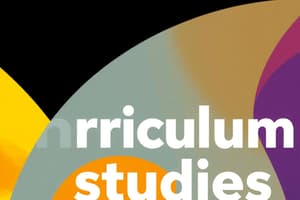Podcast
Questions and Answers
What does the ideal or recommended curriculum primarily focus on?
What does the ideal or recommended curriculum primarily focus on?
- The most appropriate curriculum for learners (correct)
- The opinions of parents on education
- The curriculum mandated by local governments
- What is currently offered in schools
Which type of curriculum is officially prescribed by the government in the Philippines?
Which type of curriculum is officially prescribed by the government in the Philippines?
- Ideal or Recommended Curriculum
- Hidden Curriculum
- Intended, Official, or Written Curriculum (correct)
- Assessable Curriculum
What plays a key role in shaping the ideal or recommended curriculum?
What plays a key role in shaping the ideal or recommended curriculum?
- Professional associations and societal trends (correct)
- Assessment methods
- Students' performance metrics
- Parents' involvement
Which of the following is NOT an example of intended, official, or written curriculum in the Philippines?
Which of the following is NOT an example of intended, official, or written curriculum in the Philippines?
What issue is often associated with curriculum projects that fail?
What issue is often associated with curriculum projects that fail?
What does the definition of curriculum as a list of subjects include?
What does the definition of curriculum as a list of subjects include?
What aspect is included in the definition of curriculum as learning experiences?
What aspect is included in the definition of curriculum as learning experiences?
Which definition of curriculum focuses on what students should learn in school?
Which definition of curriculum focuses on what students should learn in school?
What does the term 'curriculum as a discipline' imply?
What does the term 'curriculum as a discipline' imply?
In which definition is the hidden curriculum explicitly mentioned?
In which definition is the hidden curriculum explicitly mentioned?
Flashcards are hidden until you start studying
Study Notes
Definitions of Curriculum
- Curriculum is a dynamic field in education encompassing various interpretations and definitions.
- Over 1,100 books on curriculum exist, showcasing diverse characterizations and definitions by various scholars.
- Key definitions include curriculum as a list of subjects, learning experiences, intended learning outcomes, planned learning experiences, a discipline, and content or subject matter.
Types of Curriculum
- Ideal or Recommended Curriculum: Proposed by scholars, reflecting the most appropriate content for learners. Influenced by professional associations and societal trends.
- Intended, Official, or Written Curriculum: Represents the officially sanctioned curriculum defined by government agencies, such as DepEd, CHED, and TESDA in the Philippines.
Curriculum Foundations
- Psychology: Offers insights into educational objectives, student characteristics, learning processes, teaching methods, and evaluation procedures.
- Sociology and Anthropology: Highlight the significance of societal and cultural knowledge in selecting curriculum content and addressing social issues.
- Philosophy: Facilitates understanding of knowledge nature, guiding decisions on worthwhile subjects and content organization.
Curriculum Conceptions
- Various curriculum conceptions exist, impacting design and development processes. Six key conceptions include:
- Academic Rationalist: Focuses on knowledge as disciplines.
- Cognitive Processes: Aims to develop cognitive skills applicable to various problems.
- Humanistic: Centers on individual potential and personal interests.
- Social Reconstructionist: Views schooling as a means for social change.
- Technological: Focuses on systematic approaches to achieve educational goals.
- Eclectic: Combines elements from multiple conceptions in curriculum development.
Elements of a Curriculum
- Curriculum Intent: Encompasses aims, goals, and objectives guiding curriculum development.
- Aims: Broad statements of educational expectations.
- Goals: More specific than aims, addressing key concepts and skills.
- Objectives: Specific outcomes related to what students should learn.
- Learning Experiences: Activities and instructional strategies that align with curriculum intent.
- Evaluation: Tools and methods to assess whether curriculum intents and learner performance are achieved.
Reflections on Understanding Curriculum
- Familiarity with curriculum concepts enhances appreciation and effectiveness in curriculum studies, aiding curriculum workers in design and analysis of educational materials.
Studying That Suits You
Use AI to generate personalized quizzes and flashcards to suit your learning preferences.




